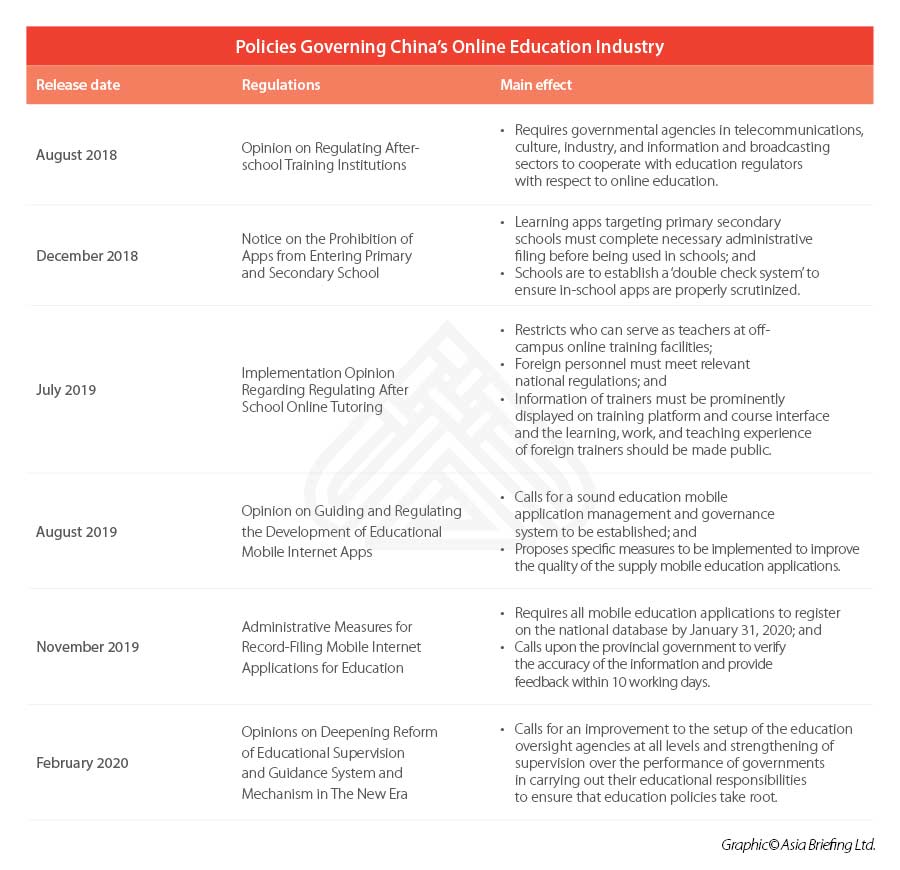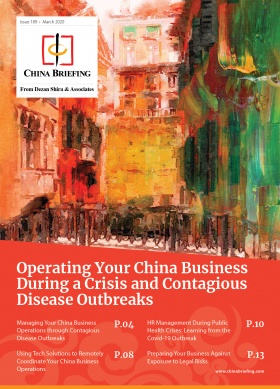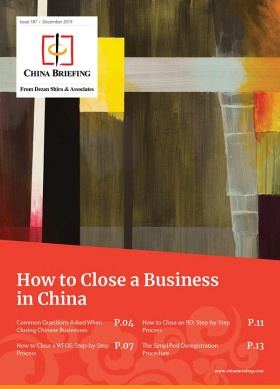Growth of China’s Online Education Industry Spurs New Regulations
- Rapidly growing demand for private and vocational education, an ever expanding internet economy, and now new behavioral trends under the COVID-19 outbreak are cumulatively set to boost China’s online education market potential, making it subject to greater regulatory scrutiny.
- Foreign investors should pay attention to the new rules and which segments are open to overseas investors.
As many as 220 million Chinese students – primary, secondary and tertiary – remain homebound following the Lunar New Year holiday. This will be the fourth consecutive week in which the start of the school term has been delayed due to the coronavirus (COVID-19) outbreak.
In response, China’s online learning applications have seen a noticeable increase in activity as schools, training centers, and parents collectively turn to digital platforms to combat the disruption caused by the outbreak.
Dingtalk for example, an office software developed by Alibaba and widely used by schools and students, has been installed 1.1 billion times in China during this epidemic period.
Spurred on by the rising demand for private and vocational education, and China’s ever-growing internet economy, the country’s online education industry has quickly become one of the world’s most lucrative markets, with annual revenue increasing from RMB 122.54 billion (US$17.5 billion) in 2015 to RMB 269.29 billion (US$38.5 billion) in 2019.
But now there is reason to believe that online education will assume a more permanent and central role in China’s education system. Some policy specialists have described previous epidemics like SARS in 2003, and now COVID-19, as ‘black swans’ or ‘tipping points,’ which could transform the online education industry into a mainstream one.
Yet, despite its recent rapid growth, regulations surrounding the online education industry have been few and mostly fragmented. This will likely change as the government closely monitors the sector, increased usage and rise of new online learning enterprises, with the result being a more systematic regulatory framework.
Here we take a look at the latest developments concerning China’s online education industry and what this means for education providers in the country.
Emerging regulatory framework for the online education industry
The online education sector sits at a unique intersection of two highly sensitive areas for China – education and the internet. This hybrid nature of the industry makes it prone to greater scrutiny.
Just three years ago, the government began releasing a series of new regulations governing two types of online education providers – mobile apps and live streaming providers.
The regulations have so far focused on three objectives:
- Short-term preemptive measures to control outstanding issues;
- Intermediate measures to construct a standardized management system; and,
- Long-term measures to improve the quality of education in the country.
The focus of the regulations has thus overwhelmingly been administrative and pragmatic – that is, establishing a better management system to effectively screen independent education providers.
The first regulation to officially address online education came in 2018 – the Opinion on Regulating After-school Training Institutions (Opinion 80), which called for all relevant government agencies, such as telecommunications, culture, industry, information and broadcasting sectors to cooperate in taking action within the online education sector. This set the tone for future regulations.
A range of different measures have since dealt with specific issues of the operation of mobile online apps – for example, the Notice on the Prohibition of Apps from Entering Primary and Secondary School (Circular 102) prohibiting harmful apps from entering primary or secondary campuses or the Implementation Opinion Regarding Regulating After School Online Tutoring (Opinion 8), which restricted who could teach at off-campus online training facilities.
Most significantly, in 2019, the Ministry of Education along with eight other ministries released the Opinions on the Orderly and Healthy Development of Educational Mobile Internet Applications (Opinion 55). This was pivotal in establishing a more long-term approach to the monitoring of mobile education apps, calling for the better management and governance of these apps.
Opinion 55 called for several specific measures to be implemented by educational administrative departments and education mobile application providers. These include, establishing and adhering to:
- A filing system for education mobile application providers;
- A standardized data management system;
- A recommendation and selection mechanisms of applications used by the Education Administrative departments; and
- Increased monitoring of content within the app, particularly where the app is aimed at minors.
Consequently, various practical measures have been introduced to implement the above stated proposals.
In November 2019, the Ministry of Education, along with eight other government departments jointly issued the Administrative Measures for Record-filing Mobile Internet Applications for Education (Teaching and Technology (2019) No.3), which mandated that all such application be registered on a national database before January 31, 2020.
The document requires the registration of all mobile education applications – the record of this information must be updated on the national public registry (also known as the National Digital Education Resources Public Service System by January 31, 2020.)
According to the notice, the accuracy of the information must then be verified by the provincial government, who will be tasked with providing feedback on the information to the provider within 10 working days. The provider will then have a further 10 working days to correct the information in case of any errors or confusion.
At the same time providers must complete their Internet Content Provider filing and protection by January 31, 2020. According to the notice, all education mobile applications that have not completed this two-step filing process by February 1, 2020 will have their license revoked.
Summary of some of the key regulations pertaining to China’s are described in the table below.
Regulatory regime tightens in the online education industry
China’s societal emphasis on learning and knowledge, along with its advanced technological infrastructure, makes investing in online education an exciting prospect. It is therefore unsurprising that as the learning landscape evolves, regulatory bodies are playing catchup.
So far, the government has demonstrated a commitment to providing a more collective response to new technologies, while acknowledging rapid growth within the industry. The nature of the unfortunate COVID-19 outbreak in Wuhan has also heightened efforts to bring online education at the forefront of the central government’s policy-making agenda.
In all likelihood this will mean more regulatory tightening of the online education industry – to ensure its growth is not at odds with government objectives.
Last year, the Ministry of Education, along with five other central authorities, led the charge on a campaign to check the operations, course content, and teacher qualification of online training providers.
By the end of the review, education authorities had finished scrutinizing 3,463 courses and 115,622 teachers of the 718 online training course providers. The campaign is expected to result in a Provincial blacklist of the unqualified or poorly-run online training providers and to suspend or shut down their services.
Thus, though online education continues to be a hotbed among investors in China, businesses must be careful when entering this market.
While some segments of the market, such as K12 compulsory education remain off limits to foreign investment, other segments such as foreign languages, vocational training and corporate training continue to be promising areas of investment for foreign investors.
Foreign investors are advised to seek local professional advice, especially as education remains sensitive area of investment in China.
About Us
China Briefing is written and produced by Dezan Shira & Associates. The practice assists foreign investors into China and has done since 1992 through offices in Beijing, Tianjin, Dalian, Qingdao, Shanghai, Hangzhou, Ningbo, Suzhou, Guangzhou, Dongguan, Zhongshan, Shenzhen, and Hong Kong. Please contact the firm for assistance in China at china@dezshira.com.
We also maintain offices assisting foreign investors in Vietnam, Indonesia, Singapore, The Philippines, Malaysia, and Thailand in addition to our practices in India and Russia and our trade research facilities along the Belt & Road Initiative.
- Previous Article COVID-19 Global Outbreaks: Coordinating Your Remote Business Operations
- Next Article COVID-19: Which IT Systems to Deploy to Assist Employees Working from Home









